Unit 2重点知识归纳
仁爱版八年级上册unit2知识点
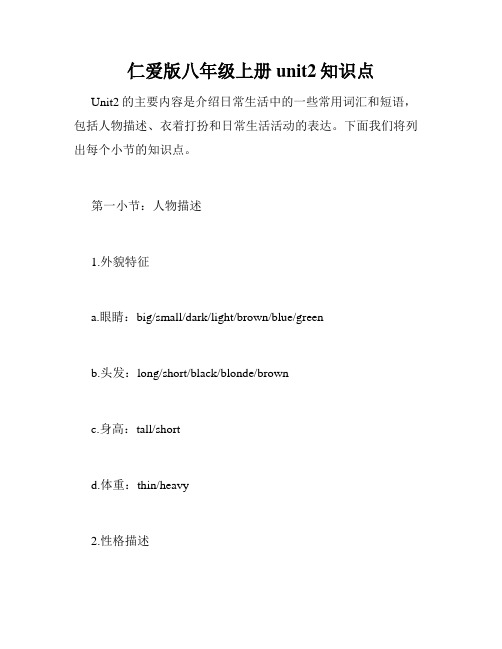
仁爱版八年级上册unit2知识点Unit2的主要内容是介绍日常生活中的一些常用词汇和短语,包括人物描述、衣着打扮和日常生活活动的表达。
下面我们将列出每个小节的知识点。
第一小节:人物描述
1.外貌特征
a.眼睛:big/small/dark/light/brown/blue/green
b.头发:long/short/black/blonde/brown
c.身高:tall/short
d.体重:thin/heavy
2.性格描述
a.开朗:outgoing/friendly
b.安静:quiet/shy
c.勇敢:brave
d.有礼貌:polite
第二小节:衣着打扮
1.上衣:T-shirt/sweater/shirt/blouse
2.裤子:jeans/pants/shorts
3.鞋子:sneakers/sandals/boots
4.配饰:necklace/bracelet/watch/earrings 第三小节:日常活动表达
1. 问路:Excuse me, can you tell me the way to...?
2. 看病:I feel sick. I need to see a doctor.
3. 看电影:Would you like to go to the movies with me?
4. 离开:Goodbye. Have a nice day.
本节重点:
1.掌握常用词汇和短语。
2.熟练应用词汇和短语,能够写出相关的句子和话题。
3.通过看图、听音等多种方式让学生掌握所学内容。
通过本节学习,学生可以扩展自己的词汇量和日常表达能力,从而达到更好的交流效果。
Unit2单元知识梳理2022-2023学年人教版九年级全册
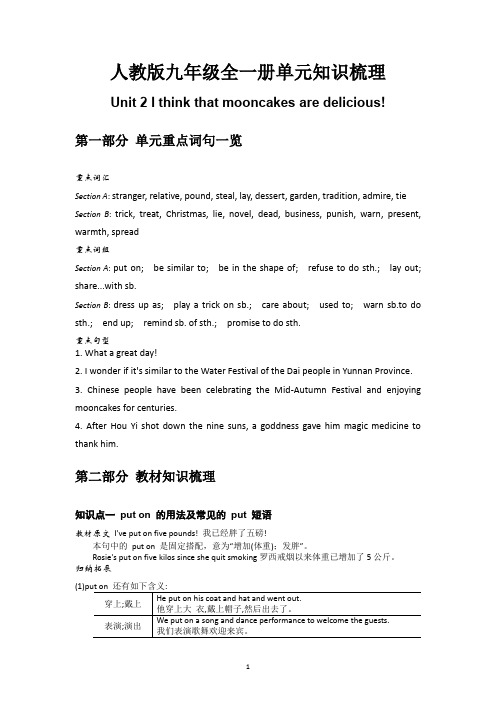
人教版九年级全一册单元知识梳理Unit 2 I think that mooncakes are delicious!第一部分单元重点词句一览重点词汇Section A: stranger, relative, pound, steal, lay, dessert, garden, tradition, admire, tie Section B: trick, treat, Christmas, lie, novel, dead, business, punish, warn, present, warmth, spread重点词组Section A: put on; be similar to; be in the shape of; refuse to do sth.; lay out; share...with sb.Section B: dress up as; play a trick on sb.; care about; used to; warn sb.to do sth.; end up; remind sb. of sth.; promise to do sth.重点句型1. What a great day!2. I wonder if it's similar to the Water Festival of the Dai people in Yunnan Province.3. Chinese people have been celebrating the Mid-Autumn Festival and enjoying mooncakes for centuries.4. After Hou Yi shot down the nine suns, a goddness gave him magic medicine to thank him.第二部分教材知识梳理知识点一put on 的用法及常见的put 短语教材原文I've put on five pounds! 我已经胖了五磅!本句中的put on 是固定搭配,意为“增加(体重);发胖”。
七年级上册英语unit2知识点归纳

七年级上册英语unit2知识点归纳本文将为大家归纳整理七年级上册英语Unit 2的知识点,旨在帮助学生更好地掌握这一单元所学内容。
一、重点词汇1. wake up:醒来例如:I usually wake up at six o'clock in the morning.2. get up:起床例如:I get up after I wake up.3. have breakfast/lunch/dinner:吃早/午/晚饭例如:I usually have breakfast at seven o'clock in the morning.4. go to school:去上学例如:I usually go to school by bus.5. do homework:做作业例如:I always do my homework after school.6. watch TV:看电视例如:I like to watch TV in the evening.二、动词时态1. 一般现在时例如:I usually wake up at six o'clock in the morning.2. 现在进行时例如:I am doing my homework now.3. 一般过去时例如:I went to the park yesterday.4. 过去进行时例如:I was watching TV when my friend called me.三、日常生活用语1. 问候例如:How are you?2. 对话例如:A:What time do you usually wake up?B:I usually wake up at six o'clock in the morning.3. 请求例如:Can you help me with my homework?4. 命令例如:Clean your room, please.四、其他重要知识点1. 序数词例如:first,second,third,fourth,fifth,sixth,seventh,eighth,ninth,tenth2. 人称代词例如:I,you,he,she,it,we,they总之,七年级上册英语Unit 2的知识点主要包括了一些基础的英语词汇、动词时态和常用口语表达等方面,希望大家通过本文的学习,能够更加熟练地运用这些知识点,从而提高自己的英语水平。
PEP小学英语六上英语Unit,2知识点考点梳理
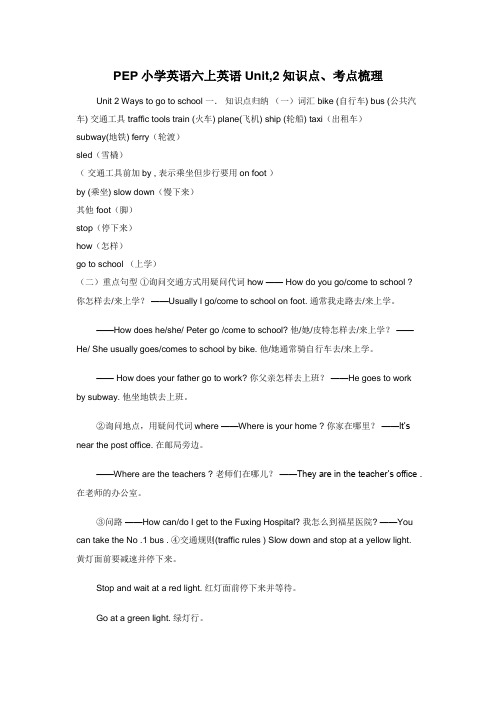
PEP小学英语六上英语Unit,2知识点、考点梳理Unit 2 Ways to go to school 一.知识点归纳(一)词汇 bike (自行车) bus (公共汽车) 交通工具 traffic tools train (火车) plane(飞机) ship (轮船) taxi(出租车)subway(地铁) ferry(轮渡)sled(雪橇)(交通工具前加by , 表示乘坐但步行要用on foot )by (乘坐) slow down(慢下来)其他 foot(脚)stop(停下来)how(怎样)go to school (上学)(二)重点句型①询问交通方式用疑问代词how —— How do you go/come to school ? 你怎样去/来上学?——Usually I go/come to school on foot. 通常我走路去/来上学。
——How does he/she/ Peter go /come to school? 他/她/皮特怎样去/来上学?——He/ She usually goes/comes to school by bike. 他/她通常骑自行车去/来上学。
—— How does your father go to work? 你父亲怎样去上班?——He goes to work by subway. 他坐地铁去上班。
②询问地点,用疑问代词where ——Where is your home ? 你家在哪里?——It’s near the post office. 在邮局旁边。
——Where are the teachers ? 老师们在哪儿?——They are in the teacher’s office . 在老师的办公室。
③问路——How can/do I get to the Fuxing Hospital? 我怎么到福星医院? ——You can take the No .1 bus . ④交通规则(traffic rules ) Slow down and stop at a yellow light.黄灯面前要减速并停下来。
英语必修二-Unit2-单元知识点总结
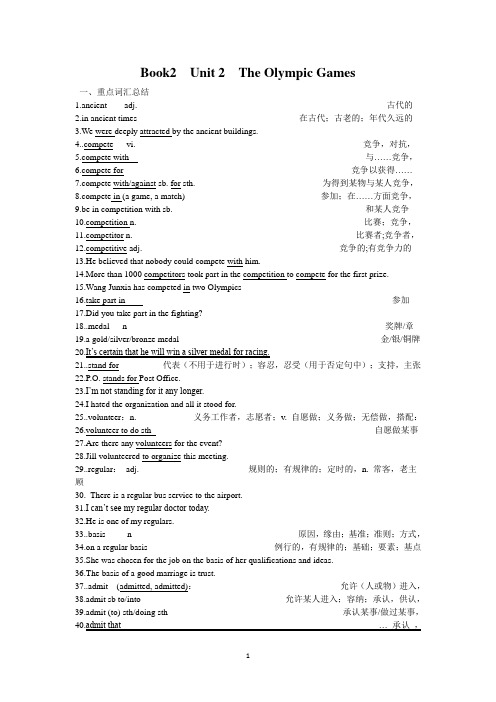
Book2 Unit 2 The Olympic Games一、重点词汇总结1.ancient adj. 古代的2.in ancient times 在古代;古老的;年代久远的3.We were deeply attracted by the ancient buildings.pete vi. 竞争,对抗,pete with 与……竞争,pete for 竞争以获得……pete with/against sb. for sth. 为得到某物与某人竞争,pete in (a game, a match) 参加;在……方面竞争,9.be in competition with sb. 和某人竞争petition n. 比赛;竞争,petitor n. 比赛者;竞争者,petitive adj. 竞争的;有竞争力的13.He believed that nobody could compete with him.14.More than 1000 competitors took part in the competition to compete for the first prize.15.Wang Junxia has competed in two Olympics16.take part in 参加17.Did you take part in the fighting?18..medal n 奖牌/章19.a gold/silver/bronze medal 金/银/铜牌20.It’s certain that he will win a silver medal for racing.21..stand for 代表(不用于进行时);容忍,忍受(用于否定句中);支持,主张22.P.O. stands for Post Office.23.I’m not standing for it any longer.24.I hated the organization and all it stood for.25..volunteer:n. 义务工作者,志愿者;v. 自愿做;义务做;无偿做,搭配:26.volunteer to do sth 自愿做某事27.Are there any volunteers for the event?28.Jill volunteered to organize this meeting.29..regular:adj. 规则的;有规律的;定时的,n. 常客,老主顾30. There is a regular bus service to the airport.31.I can’t see my regular doctor today.32.He is one of my regulars.33..basis n 原因,缘由;基准;准则;方式,34.on a regular basis 例行的,有规律的;基础;要素;基点35.She was chosen for the job on the basis of her qualifications and ideas.36.The basis of a good marriage is trust.37..admit (admitted, admitted):允许(人或物)进入,38.admit sb to/into 允许某人进入;容纳;承认,供认,39.admit (to) sth/doing sth 承认某事/做过某事,40.admit that … 承认,41.admit sb/sth to be adj./n 承认……是……42.The servant opened the door and admitted me into the house.43.Only one hundred boys are admitted to the school every year.44.The theatre admits only 200 persons.45.I admit my mistake.46.He admitted making a big mistake.47.You must admit the task to be difficult.48.as well 也,又,还49.Air is necessary for people; it is necessary for plants as well.50..host :vt. 做东,主办;n. 主人,东道主51.He is willing to host the visitors.52..responsibility:n. 责任,负责53.responsibility for (doing) sth/ to do sth (做)……责任;对……负责54.take responsibility for (doing) sth 对……负责任55. take on the responsibility 承担责任; (n.) 职责;义务;任务56.responsibility to sb 对某人负责,57.responsibility to do sth 做某事的责任,58.a sense of responsibility 责任感,59.responsible adj. 有责任的,有义务的;可信赖的60.They have responsibility for ensuring that the rules are enforced.61.She feels a strong sense of responsibility to help these countries.62.replace vt. 代替,取代,63.replace sth/sb 取代某物/某人,64.replace sth/sb with/by 以……代替某物/某人;替换;65.replace sb/sth = take the place of sb/sth = take sb’s /sth’s place 取代,替代66.Can anything replace a mother’s love?67.If he can’t manage he’ll have to be replaced.68.charge vt. 指控,控告;起诉;指责; 收费,要价,n. 要价,收费,n. 主管,掌管,责任69.charge sb/sth for sth 因……而向某人收费,70.charge sb sth for sth 因……而向某人收……费;71.charge sb with sth 指控某人某事;72.charge sb with doing sth 指控某人做了事;73.free of charge =for free 免费;74.take charge of 负责,掌管,75.in charge of 主管,掌管,76. in the charge of 被掌管77.What did they charge for the repairs?78.He was charged with murder.79.Delivery is free of charge.80.He took charge of the farm after his father’s death.81..fine vt. 罚款,处某人以罚金,n. 罚金,罚款;adj. 可接受的,满意的82.fine sb for sth 因……而罚某人的款;83.He was fined for speeding.84.I’ll leave this here, ok? Fine.85.advertise vt. 为……做广告;登广告,86.advertise sth 登广告宣传某物,87.advertise for sb/sth 为征求……登广告;88.advertisement = ad 广告;89.advertising n. 广告,广告业90.They advertise their new product on TV.91.The company is advertising for typists in the newspapers.92.bargain v. 讨价还价,商讨条件,n.便宜货;n. 协议;交易:93.bargain with sb over/about/for sth 就某物与某人讨价还价;94.make a bargain with sb about sth 与某人就某事/物达成协议95.He was bargaining with the shop owner over the price.96.The car was a bargain at that price.97. one after another 一个接一个地;依次地98.Strange things happened one after another.99. deserve v. (不用于进行时态)值得,应得,应受100.You deserve a rest after all that hard work.101.What have I done to deserve this?注意:deserve后接doing或动名词的主动形式表示被动意义,等于接不定式的被动语态。
人教版初中英语新教材七年级上Unit2知识点归纳总结(复习必背)

Unit 2 We’re family !学习目标单元主题人与社会→社会服务与人际沟通→和谐家庭必备单词Section A1.mean/mi:n/v.意思是;打算2.husband/'hʌzbənd/n.丈夫3.bat/bæt/n.球棒;球拍4.together/tə'geðə(r)/adv.在一起;共同5.spend/spend/v.花(时间、钱等)6.really/'ri:əli/adv.非常;确实;真正地7.member/'membə(r)/n.成员;会员8.activity/æk'tɪvəti/n.活动9.chess/tʃes/n.国际象棋10.funny/'fʌni/adj.好笑的;奇怪的→fun(n.乐趣)11.laugh/la:f/v.笑;发笑n.笑声12.different/'dɪfrənt/adj.不同的→difference(n.差别;不同)13.violin/,vaɪə'lɪn/n.小提琴Section B1.hat/hæt/n.帽子2.handsome/'hænsəm/adj.英俊的3.knee/ni:/n.膝;膝盖4. grandchild /'græntfaɪld/ n.(pl.grandchildren /'græn,tʃɪldrən/) (外)孙子;(外)孙女5.son/sʌn/n.儿子6.hike/haɪk/v.&n.远足;徒步旅行高频短语e in 进来2.ping-pong bat乒乓球拍3.play ping-pong打乒乓球4.every day每天5.fishing rod钓竿6.a lot of/lots of大量;许多7.Chinese chess中国象棋8.play the erhu 拉二胡9.big and clean classroom 又大又干净的教室10.have fun 玩得11.on the left/right 在左边/右边12.at night在夜晚13.in the middle 中间,中部14.go hiking远足15.family photo 家庭照片16.every week 每周17.next to紧邻;在……近旁18.family tree 家谱常考句型1.询问家庭成员:(1)-Is this/Are these your...?这是/这些是你的······吗?-Yes,.../No,...是的,······/不,······(2)-Who's/Who're...?······是谁?-He's/She's/They're...他是/她是/他(她)们是·······2.询问日常发生的事:-Do you often play ping-pong together?你们经常一起打乒乓球吗?-Yes,we play every day/week.是的,我们每天/每周都打。
新教材高中英语Unit2Onwardsandupwards单元重点知识回顾外研版选择性必修第一册
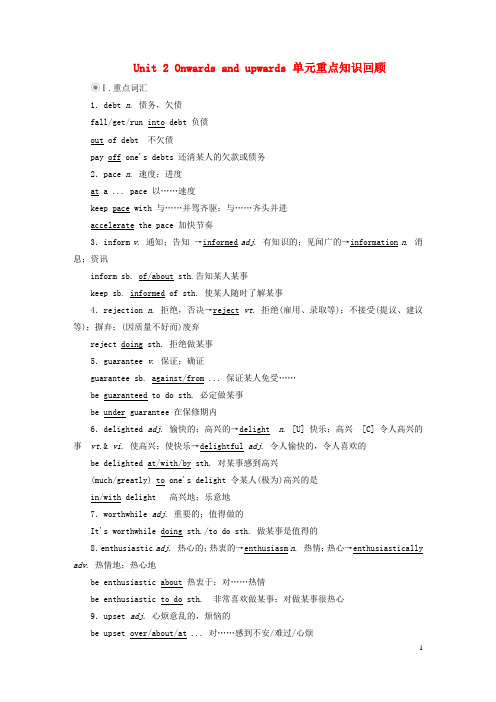
Unit 2 Onwards and upwards 单元重点知识回顾Ⅰ.重点词汇1.debt n. 债务,欠债fall/get/run into debt 负债out of debt 不欠债pay off one's debts 还清某人的欠款或债务2.pace n. 速度;进度at a ... pace 以……速度keep pace with 与……并驾齐驱;与……齐头并进accelerate the pace 加快节奏3.inform v. 通知;告知→informed adj. 有知识的;见闻广的→information n. 消息;资讯inform sb. of/about sth.告知某人某事keep sb. informed of sth. 使某人随时了解某事4.rejection n. 拒绝,否决→reject vt. 拒绝(雇用、录取等);不接受(提议、建议等);摒弃;(因质量不好而)废弃reject doing sth. 拒绝做某事5.guarantee v. 保证;确证guarantee sb. against/from ... 保证某人免受……be guaranteed to do sth. 必定做某事be under guarantee 在保修期内6.delighted adj. 愉快的;高兴的→delight n. [U] 快乐;高兴[C] 令人高兴的事vt.& vi. 使高兴;使快乐→delightful adj. 令人愉快的,令人喜欢的be delighted at/with/by sth. 对某事感到高兴(much/greatly) to one's delight 令某人(极为)高兴的是in/with delight 高兴地;乐意地7.worthwhile adj. 重要的;值得做的It's worthwhile doing sth./to do sth. 做某事是值得的8.enthusiastic adj. 热心的;热衷的→enthusiasm n. 热情;热心→enthusiastically adv. 热情地;热心地be enthusiastic about 热衷于;对……热情be enthusiastic to do sth. 非常喜欢做某事;对做某事很热心9.upset adj. 心烦意乱的,烦恼的be upset over/about/at ... 对……感到不安/难过/心烦upset vt. (upset, upset) 使不安;使心烦;打翻;打乱It upsets sb. that ... 让某人心烦的是……10.elect v. 选举;推选→election n. 选举;推选elect sb. to do 选举某人做某事elect sb. (as/to be)+职位选某人当……11.blessing n. 幸事,幸运→bless v. 求上帝或神赐福与某人(物,事物)bless sb./sth. with sth. 施惠或赐福于12.appreciative adj. 感激的→appreciate vt. 欣赏,赞赏;感谢;领会,理解→appreciation n. 欣赏;感激appreciate+n./pron./v.-ing 欣赏/感激……I would appreciate it if ... 假如……,我将不胜感激13.embarrassed adj. 难堪的;尴尬的→embarrass vt. 使尴尬;使困窘;使陷入困境→embarrassing adj. 令人尴尬的;令人难堪的be/feel embarrassed at/about 对……感到尴尬to one's embarrassment 使某人尴尬的是14.worthy of 值得……的Ⅱ.教材原句1.Everyone knows that success rarely happens overnight, but perhaps not many know that a lot of highly successful writers have previously faced rejection. (P14) 每个人都知道成功很少是在一夜之间发生的,但可能没有多少人知道很多非常成功的作家之前都面临过被拒绝的情况。
鲁教版(五四制)六年级英语上册Unit2重难点知识点归纳
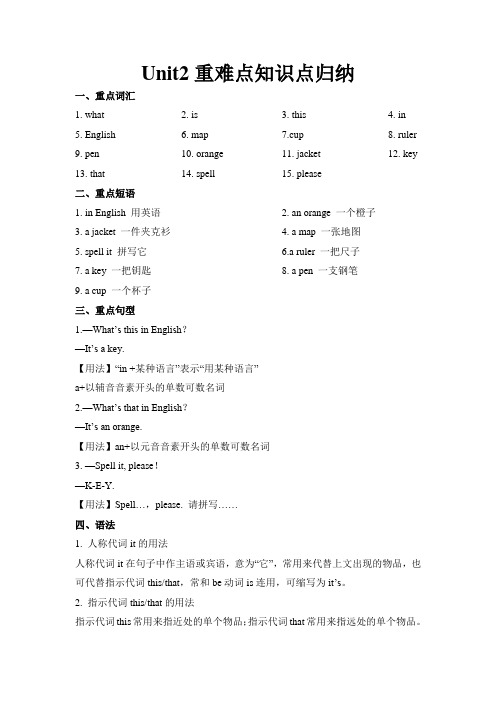
Unit2重难点知识点归纳一、重点词汇1. what2. is3. this4. in5. English6. map7.cup8. ruler9. pen 10. orange 11. jacket 12. key13. that 14. spell 15. please二、重点短语1. in English 用英语2. an orange 一个橙子3. a jacket 一件夹克衫4. a map 一张地图5. spell it 拼写它6.a ruler 一把尺子7. a key 一把钥匙8. a pen 一支钢笔9. a cup 一个杯子三、重点句型1.—What’s this in English?—It’s a key.【用法】“in +某种语言”表示“用某种语言”a+以辅音音素开头的单数可数名词2.—What’s that in English?—It’s an orange.【用法】an+以元音音素开头的单数可数名词3. —Spell it, please!—K-E-Y.【用法】Spell…,please. 请拼写……四、语法1. 人称代词it的用法人称代词it在句子中作主语或宾语,意为“它”,常用来代替上文出现的物品,也可代替指示代词this/that,常和be动词is连用,可缩写为it’s。
2. 指示代词this/that的用法指示代词this常用来指近处的单个物品;指示代词that常用来指远处的单个物品。
3. 不定冠词a/an的用法冠词是置于名词之前,说明名词所表示的人或事物的一种虚词。
不定冠词常表示“一”的概念,有两种形式:a和an。
a用在以辅音音素开头的名词前,an用在以元音音素开头的名词前。
特殊情况:(1)元音字母u的读音以辅音音素开头,因此“一个u”应表达为“a u”。
(2)以元音字母开头的词以辅音音素开头,其前面用a。
如:a useful book 一本有用的书a uniform 一套制服a European country 一个欧洲国家(3)以辅音字母开头的词,辅音字母不发音,而以元音音素开头,其前面用an。
五年级上册英语单元知识梳理:Unit 2 重点知识归纳

Unit 2 My week一.重点单词(能听,说,读,写的单词)1.星期一到星期天首字母要大写。
Monday(Mon.) 周一Tuesday(Tue.) 周二Wednesday(Wed.)周三Thursday(Thu.) 星期四Friday(Fri.) 周五Saturday(Sat.) 周六Sunday (Sun.)周日weekend 周末wash my clothes 洗我的衣服do homework 做作业watch TV 看电视read books 读书play football 踢足球二.三会单词(会听,说,读的单词)often通常cooking烹饪tired疲惫的sport体育运动should 应该day一天三.语音发音ea ee /i:/ read 读书feed 喂养beef牛肉feet双脚meet遇见tea 茶eat吃三.重点句型:(深黑色字体的要求会听,说,读,写)1.----What day is it today?今天是星期几---It’s Saturday.今天星期六。
2.---What do you have on Thursdays ?星期四你们上什么课?--- I have math,English and music .我们上数学英语和音乐课。
3.---What do you do on Thursdays, Grandpa?爷爷,星期四你要做什么?---I have a cooking class with your grandma.我要和你奶奶去上烹饪课。
4.---Do you often read books in this park?你经常在这个公园看书吗?---Yes,I do.是的---No,I don’t.不是5.Look at my picture.看我的图片。
6.You look tired. 你看起来很累。
四.掌握句型。
(会提问,会回答)1.怎样问星期及怎样回答。
Unit 2 Topic 2 ---3重难点知识归纳总结2021-2022学年仁爱版英语八年级上册
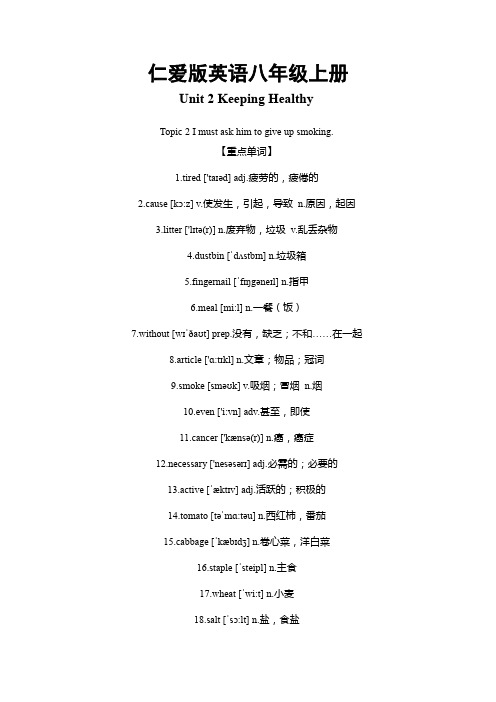
仁爱版英语八年级上册Unit 2 Keeping HealthyTopic 2 I must ask him to give up smoking.【重点单词】1.tired ['taɪəd] adj.疲劳的,疲倦的2.cause [kɔ:z] v.使发生,引起,导致n.原因,起因3.litter ['lɪtə(r)] n.废弃物,垃圾v.乱丢杂物4.dustbin [ˈdʌstbɪn] n.垃圾箱5.fingernail [ˈfɪŋgəneɪl] n.指甲6.meal [mi:l] n.一餐(饭)7.without [wɪˈðaʊt] prep.没有,缺乏;不和……在一起8.article ['ɑ:tɪkl] n.文章;物品;冠词9.smoke [sməʊk] v.吸烟;冒烟n.烟10.even ['i:vn] adv.甚至,即使11.cancer ['kænsə(r)] n.癌,癌症12.necessary ['nesəsərɪ] adj.必需的;必要的13.active [ˈæktɪv] adj.活跃的;积极的14.tomato [təˈmɑ:təu] n.西红柿,番茄15.cabbage [ˈkæbɪdʒ] n.卷心菜,洋白菜16.staple [ˈsteipl] n.主食17.wheat [ˈwi:t] n.小麦18.salt [ˈsɔ:lt] n.盐,食盐19.sugar [ˈʃugə] n.食糖20.illness [ˈɪlnəs] n.疾,疾病21.weak [wi:k] n.虚弱的,无力的22.cream [kri:m] n.奶油,乳脂23.ice cream 冰淇淋24.force [fɔ:s] v.强迫,迫使25.childhood [tʃaildhud] n.童年,幼年26.plate [pleɪt] n.盘子,碟子;一盘27.mad [maid] adj.疯的28.taste [teɪst] v.尝,品;吃n.味道29.surprise [səˈpraɪz] v.使惊奇,使诧异n.惊奇,惊讶30.watermelon [ˈwɔ:təmelən] n.西瓜31.potato [pəˈteɪtəʊ] n.土豆,马铃薯32.sandwich ['sænwɪdʒ] n.三明治(夹心面包片)33.strawberry ['strɔ:bərɪ] n.草莓34.beef [bi:f] n.牛肉35.biscuit [biskit] n.饼干36.such [sʌtʃ] pron.这样的,那样的,类似的37.etc [etsetərə] abbr.等等,以及其他38.fact [fækt] n.事实,真相;现实39.unhealthy [ʌn'helθɪ] adj.不健康的40.chemical [kemikl] n.化学品41.cigarette [sigəret] n.香烟,纸烟42.body ['bɒdɪ] n.身体43.disease [dɪˈzi:z] n.病,疾病44.harm [ha:m] v.&n.危害,伤害,损害45.smoker [sməʊkə] n.吸烟者46.second-hand adj. 二手的,旧的47.risk [risk] n.危险,风险v.(使)冒……的风险48.possible [pɔsəbl] adj.可能;能做到【重点短语】1.in fact 事实上,实际上2.as... as possible 尽量……地3.give up 放弃4.stay up late 熬夜5.be bad for 对……有害6.put... into... 把……放进……7.get up 起床8.be good for 有利于9.take a walk 散步10.have a bath 沐浴11.force sb to do sth 强迫某人做某事12.leave for 动身去,出发前往【重点句型】1.Staying up late is bad for your health. 熬夜对你的健康有害。
语文版中职英语基础模块3 Unit2重点语言知识归纳
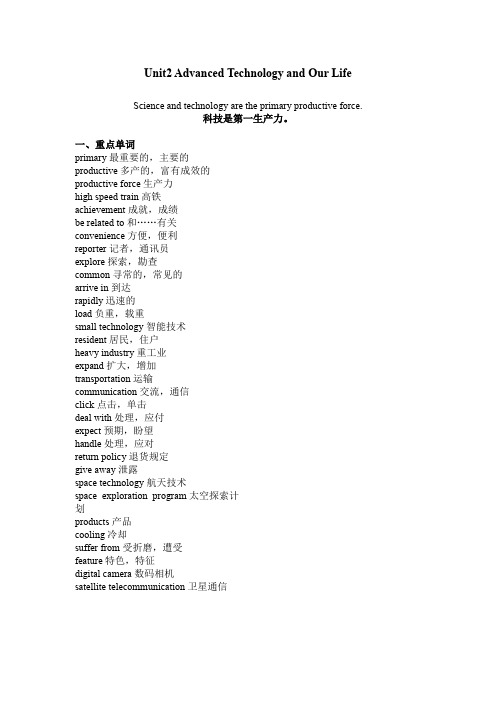
Unit2 Advanced Technology and Our LifeScience and technology are the primary productive force.科技是第一生产力。
一、重点单词primary最重要的,主要的productive多产的,富有成效的productive force生产力high speed train高铁achievement成就,成绩be related to和……有关convenience方便,便利reporter记者,通讯员explore探索,勘查common寻常的,常见的arrive in到达rapidly迅速的load负重,载重small technology智能技术resident居民,住户heavy industry重工业expand扩大,增加transportation运输communication交流,通信click点击,单击deal with处理,应付expect预期,盼望handle处理,应对return policy退货规定give away泄露space technology航天技术space exploration program太空探索计划products产品cooling冷却suffer from受折磨,遭受feature特色,特征digital camera数码相机satellite telecommunication卫星通信二、重点短语Warm-upmore and more convenient 越来越便利be related to 跟……有关the development of science and technology 科技的发展in the future 在将来Listeningin one’s free time 在空闲时间shared bikes 共享单车get on 上车arrive in 到达high-speed train 高铁Readingin the past decade 在过去十年leave... for 离开去at a speed of 350 km/h 以每小时350公里时速in northeastern China 在中国东北collect and analyse data 搜集和分析数据in the Beijing-Tianjin-Hebei region 在京津冀地区play an important role 起重要作用used to 过去是put...to use 把……投入使用as well as 还有Speakingon the internet 在网上shop online 网购keep a few tips in mind 牢记几条建议be familiar with 对……熟悉deal with 处理delivery date 发货日期shipping and handling fees 快递和手续费return policies 退货政策reviews from other customers 来自顾客的评价give away 泄漏do a lot of online shopping 大量网购enjoy online shopping experience 享受网购体验Culture Cornerbe related to 跟……有关such as 比如suffer from 遭受digital cameras 数码相机in the 1960s 在20世纪60年代provide... to 提供给more than 多human beings 人类phone messages 短信data transmission 数据迁移televised education 远程教育mobile telecommunication 移动通信三、重点句子Listening1.In my free time in China,I love to explore new places.2.Shared bikes are also a way to get some exercise and help the environment.3.It could take about 15 hours to arrive in Beijing.4.A high-speed train takes only about five hours.5.Space technology is closely related to our everyday lives.1.在中国的空闲时间里,我喜欢探索新的地方。
人教版九年级英语上册课件:Unit 2单元知识归纳(共13张PPT)
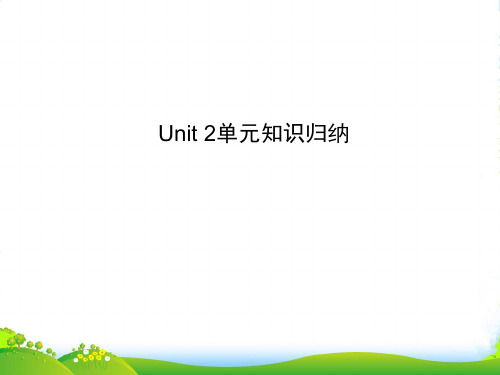
• Ⅱ.重点短语 • 1.The Water Festival in Thailand泰国
的泼水节
• 2.a little too crowded有点儿太拥挤 • 3.not that interesting并没有那么有趣 • 4.have/eat zongzi吃粽子 • 5.watch the races看比赛 • 6.be fun to do sth.做某事很有趣 • 7.eat out 出去吃饭 • 8.on one’s vacation在假期
• 9.eat five meals a day一天吃五顿饭 • 10.put on five pounds增重五磅 • 11.in two weeks两周后 • 12.the hottest month of the year • 一年中最热的一个月 • 13.be similar to与……相似 • 14.the Dai people in Yunnan Province
• 25.refuse to do sth.拒绝做某事 • 26.call out大声叫喊 • 27.lay out摆出;铺开;安排;布置;
设计
• 28.share sth.with sb.与某人分 享……
• 29.on the earth 在地球上 • 30.at night在晚上 • 31.as a result因此 • 32.take sb.out for lunch带某人出去吃
• 他多么想嫦娥能够回来啊!
• 6.But behind all these things lies the true meaning of Christmas.
• 但是在所有这些东西的背后有圣诞节的 真谛。
• 7.He now treats everyone with kindness and warmth,spreading love and joy everywhere he goes.
小学五年级英语上册Unit 2重点知识梳理

五年级英语上册《Unit 2》重点单词+句子+语法+作文重点单词Sunday周日Monday周一Tuesday周二Wednesday周三Thursday周四Friday 周五Saturday周六Weekend 周末(周六、日)wash my clothes 洗衣服watch TV 看电视do homework 做作业read books 看书play football 踢足球on the weekend 在周末listen to music 听音乐play ping-pong 打乒乓球play sports/do sports 做体育运动重点句子1.—What do you have on Thursdays?星期四你们上什么课?—I have math, English and music.我们上数学、英语和音乐课。
2.—What do you do on Thursdays, Grandpa?爷爷,星期四你要做什么?—I have a cooking class with your grandma.我和你奶奶去上烹饪课。
3.—Do you often read books in this park?你经常在这个公园看书吗?—Yes, I do. 是的—No, I don’t. 不是4. Look at my picture. 看我的图片。
5. You look tired. 你看起来很累。
6. You should play sports every day.你应该每天做运动。
语音:字母组合ee, ea在单词中的的发音:[ i: ]例:feet/beef/meet/see/feed/ea/read/eat/repeat 脚/牛肉/遇见/看见/喂养/茶/阅读/吃/重复注:1、ee组合绝大部分发长音[ i: ],只有少部分发短音[ i ] 如:coffee 咖啡2、ea字母组合除了发[ i: ],还有可能发[ e ]等发音如:bread 面包,或者发[ ei ],如:great 好极了重点知识及语法1.询问做什么事/活动:—What do you do …?—I often play ping-pong…询问星期几上什么课:—What do you have on…?—We have English class…2.般疑问句的问与答:—Do you often read books?—Yes, I do. —No, I don’t.1、on+具体某一天(年月日,星期),如on Monday/Tuesday…课外1.at+具体时刻(…点钟)如:at 12 o’clock 在十二点整补充:in+大致时间(年月,早中晚),如:in 2014 在2014年in the morning/afternoon/evening2.play + 球类、棋类、娱乐活动,如:play football/ping-pong补充:play + the + 乐器(第四单元知识),如:play the pipa/piano/violin…重点作文描写一周的生活,如:My weekMy weekMy name is Li Ming. I go to school from Monday to Friday. I like Tuesdays and Thursdays, because I have music and PE. I often do my homework and read books on Saturdays. I often play ping-pong on Sundays.。
人教版九年级英语unit2知识归纳

人教版九年级英语unit2知识归纳人教版九年级英语unit2知识1Mooncake['mu:nke?k]n.月饼lantern[?l?nt?(r)n]n.灯笼stranger[?streind??(r)]n.陌生人relative[?rel?tiv]n.亲属;亲戚puton增加(体重);发胖pound[paund]n.磅(重量单位);英镑folk[f?uk]adj.民间的;民俗的goddess[?g?des][?ɡɑd?s]n.女神whoever[hu:?ev?pron.无论是谁;不管谁;任何人steal[sti:l]v.(stole[st?ul],stolen[st?ul?n])偷;窃取lay[lei]v.(laid[leid],laid)放置;产(卵)layout摆开;布置dessert[di?z?:(r)t]n.(饭后)甜点;甜食garden[ga:(r)dn]n.花园;园子tradition[tr??d??n]n.传统admire[?d?mai?(r)]v.欣赏;仰慕tie[tai]n.领带v.捆;束haunted[?h?:ntid]adj.有鬼魂出没的ghost[g?ust]n.鬼;鬼魂trick[trik]n.花招;把戏treat[tri:t]n.款待;招待;请客spider[?spaid?r)]n.蜘蛛Christmas[?krism?s]n.lie[laI]v.(lay[leI],lain[leIn])存在;平躺;处于novel[?n?vl][?na:vl]n.(长篇)小说eve[i:v]n.(尤指宗教节假日的)前夕;前夜dead[ded]adj.死的;失去生命的business[?bizn?s]n.生意;商业punish[?p?nis]v.处罚;惩罚warn[w?:(r)n]v.警告;告诫endup最终成为;最后处于present[preznt]n.现在;礼物adj.现在的nobody[n?ub?di][n?uba:di]pron.没有人warmth[w?:(r)mθ]n.温暖;暖和spread[spred]v.传播;展开n.蔓延;传播Macao[m??kau]澳门ChiangMai[?t?i?n?maI],[d?a:nmaI]清迈(泰城市)WaterFestiwal泼水节Mid-AutumnMother'sDayFather'sDayHalloween[?h?l?u?i:n]前夕AChristmasCarol《圣诞欢歌》(小说名)Easter复活节Clara[?kla:r?][?kler?]克拉拉(女名)Santa[?s?nt?]Claus[kl?:z]圣诞老人Charles[t?a:(r)lz]Dickens[?dik?nz]查尔斯?狄更斯(英)Scrooge[skru:d?]斯克鲁奇n.(非正式)吝啬鬼Jacob[?d?eik?b]Marley[?ma:(r)li]雅各布?马利人教版九年级英语unit2知识2知识梳理【重点】1.puton增加(体重);发胖2.careabout关心;在乎endup最终成为,最后处于notonly……butalso……不但……而且……5.shootdown射下edtodo过去常常做……7.remindsb.of使某人想起8.giveout分发发放thewaterfestival泼水节theChinesespringfestival中国11.nextyear明年12.soundlike听起来像13.eachother互相彼此19.asaresult结果因此20.Mother’sday母亲节21.moreandmorepopular越来越受欢迎22.thinkof想起;认为;思考dressup装扮穿上盛装theimportanceof……的重要性25.makemoney挣钱26.inneed需要帮助处于困境中27.between…and…在……和……之间28.thedragonboatfestival龙舟节29.thelanternfestival30.likebest最喜欢31.goto…foravacation去……度假32.besimilarto与……相似washaway冲走洗掉Mid-autumnfestival中秋节35.shootdown射下36.callout大声呼喊37.thetraditionof……的传统38.atnight在夜里;在晚上one…,theother…一个……,另一个…...Father’sday父亲节【重点句型】1.Ithinkthatthey’refuntowatch.我认为它们看着很有意思。
高中英语必修三Unit 2 Morals and Virtues知识点归纳(单词、短语、句型、语法)
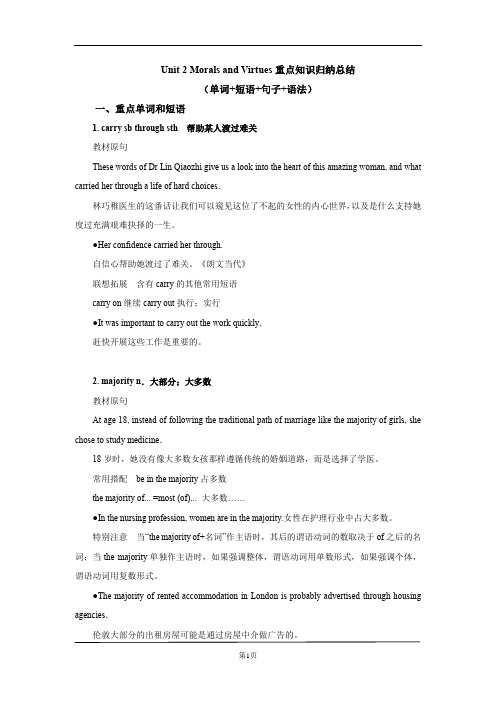
Unit 2 Morals and Virtues重点知识归纳总结(单词+短语+句子+语法)一、重点单词和短语1. carry sb through sth 帮助某人渡过难关教材原句These words of Dr Lin Qiaozhi give us a look into the heart of this amazing woman, and what carried her through a life of hard choices.林巧稚医生的这番话让我们可以窥见这位了不起的女性的内心世界,以及是什么支持她度过充满艰难抉择的一生。
●Her confidence carried her through.自信心帮助她渡过了难关。
《朗文当代》联想拓展含有carry的其他常用短语carry on继续carry out执行;实行●It was important to carry out the work quickly.赶快开展这些工作是重要的。
2. majority n.大部分;大多数教材原句At age 18, instead of following the traditional path of marriage like the majority of girls, she chose to study medicine.18岁时,她没有像大多数女孩那样遵循传统的婚姻道路,而是选择了学医。
常用搭配be in the majority占多数the majority of... =most (of)... 大多数……●In the nursing profession, women are in the majority.女性在护理行业中占大多数。
特别注意当“the majority of+名词”作主语时,其后的谓语动词的数取决于of之后的名词;当the majority单独作主语时,如果强调整体,谓语动词用单数形式,如果强调个体,谓语动词用复数形式。
人教版四年级英语下册Unit 2 What time is it(几点钟了)知识点归纳
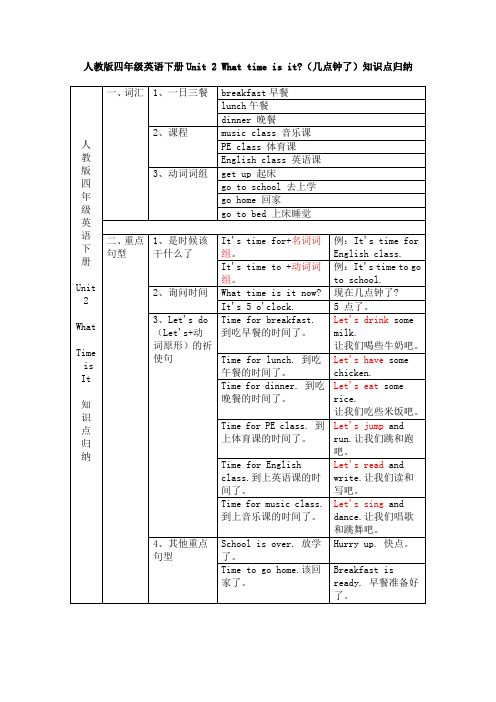
2、询问时间
What time is it now?
现在几点钟了?
It's 5 o'clock.
5 点了。
3、Let's do(Let's+动词原形)的祈使句
Time for breakfast.
到吃早餐的时间了。
Let's drinksome milk.
让我们喝些牛奶吧。
Time for lunch. 到吃午餐的时间了。
Let's havesome chicken.
Time for dinner. 到吃晚餐的时间了。
Let's eatsome rice.
让我们吃些米饭吧。
Time for PE class. 到上体育课的时间了。
Let's jumpand run.让我们跳和跑吧。
Time for English class.到上英语课的时间了。
3、动词词组
get up 起床
go to school 去上学
go home 回家
go to bed 上床睡觉
二、重点句型
1、是时候该干什么了
It's time for+名词词组。
例:It's time for English class.
It's time to +动词词组。
例:It's time to go to school.Байду номын сангаас
Let's readand write.让我们读和写吧。
Time for music class.到上音乐课的时间了。
英语八年级下册unti2知识点
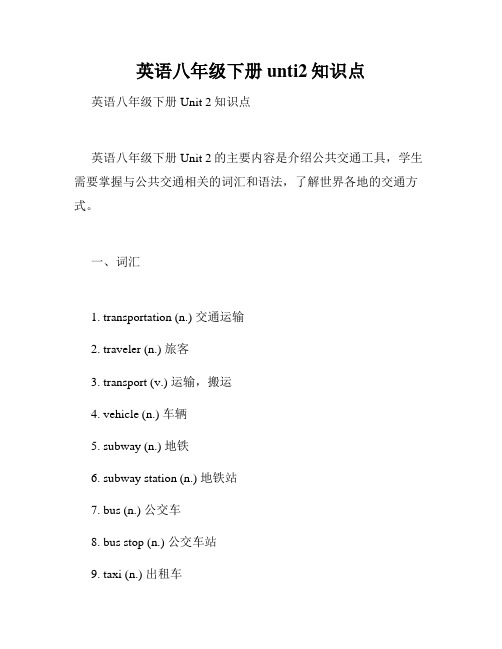
英语八年级下册unti2知识点英语八年级下册Unit 2知识点英语八年级下册Unit 2的主要内容是介绍公共交通工具,学生需要掌握与公共交通相关的词汇和语法,了解世界各地的交通方式。
一、词汇1. transportation (n.) 交通运输2. traveler (n.) 旅客3. transport (v.) 运输,搬运4. vehicle (n.) 车辆5. subway (n.) 地铁6. subway station (n.) 地铁站7. bus (n.) 公交车8. bus stop (n.) 公交车站9. taxi (n.) 出租车10. bridge (n.) 桥11. intersection (n.) 十字路口12. pedestrian (n.) 行人13. traffic light (n.) 交通灯14. highway (n.) 高速公路15. tram (n.) 有轨电车二、语法1. 现在进行时现在进行时用来描述正在进行的动作或状态,结构为 be + 动词+ ing,例如:I am taking the subway to work. 我正在坐地铁去上班。
They are walking to the bus stop. 他们正在步行去公交车站。
2. 一般现在时一般现在时用来描述经常性或习惯性的动作或状态,结构为主语+动词原形,例如:She usually takes the bus to school. 她通常乘公交车去上学。
The traffic light turns red. 交通灯变为红色。
3. 介词 in 和 on 的用法in 用来表示在某个范围之内,例如在一年中的某个月份、某个季节等,例如:I usually travel in the summer. 我通常在夏天旅行。
He studies in the library. 他在图书馆学习。
on 用来表示在某个表面上,例如在地图、日历、时间上,例如:She marked the date on the calendar. 她在日历上标记了日期。
Unit 2知识归纳人教版英语八年级上册
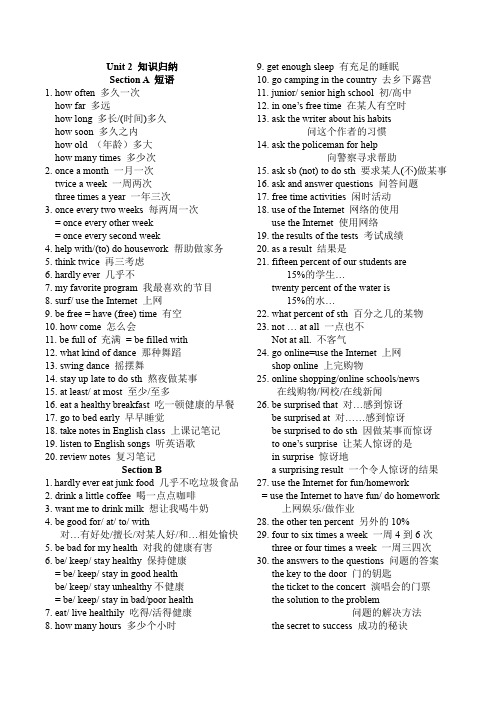
Unit 2 知识归纳Section A 短语1. how often 多久一次how far 多远how long 多长/(时间)多久how soon 多久之内how old (年龄)多大how many times 多少次2. once a month 一月一次twice a week 一周两次three times a year 一年三次3. once every two weeks 每两周一次= once every other week= once every second week4. help with/(to) do housework 帮助做家务5. think twice 再三考虑6. hardly ever 几乎不7. my favorite program 我最喜欢的节目8. surf/ use the Internet 上网9. be free = have (free) time 有空10. how come 怎么会11. be full of 充满= be filled with12. what kind of dance 那种舞蹈13. swing dance 摇摆舞14. stay up late to do sth 熬夜做某事15. at least/ at most 至少/至多16. eat a healthy breakfast 吃一顿健康的早餐17. go to bed early 早早睡觉18. take notes in English class 上课记笔记19. listen to English songs 听英语歌20. review notes 复习笔记Section B1. hardly ever eat junk food 几乎不吃垃圾食品2. drink a little coffee 喝一点点咖啡3. want me to drink milk 想让我喝牛奶4. be good for/ at/ to/ with对…有好处/擅长/对某人好/和…相处愉快5. be bad for my health 对我的健康有害6. be/ keep/ stay healthy 保持健康= be/ keep/ stay in good healthbe/ keep/ stay unhealthy不健康= be/ keep/ stay in bad/poor health7. eat/ live healthily 吃得/活得健康8. how many hours 多少个小时9. get enough sleep 有充足的睡眠10. go camping in the country 去乡下露营11. junior/ senior high school 初/高中12. in one’s free time 在某人有空时13. ask the writer about his habits问这个作者的习惯14. ask the policeman for help向警察寻求帮助15. ask sb (not) to do sth 要求某人(不)做某事16. ask and answer questions 问答问题17. free time activities 闲时活动18. use of the Internet 网络的使用use the Internet 使用网络19. the results of the tests 考试成绩20. as a result 结果是21. fifteen percent of our students are15%的学生…twenty percent of the water is15%的水…22. what percent of sth 百分之几的某物23. not … at all 一点也不Not at all. 不客气24. go online=use the Internet 上网shop online 上完购物25. online shopping/online schools/news在线购物/网校/在线新闻26. be surprised that 对…感到惊讶be surprised at 对……感到惊讶be surprised to do sth 因做某事而惊讶to one’s surprise 让某人惊讶的是in surprise 惊讶地a surprising result 一个令人惊讶的结果27. use the Internet for fun/homework= use the Internet to have fun/ do homework 上网娱乐/做作业28. the other ten percent 另外的10%29. four to six times a week 一周4到6次three or four times a week 一周三四次30. the answers to the questions 问题的答案the key to the door 门的钥匙the ticket to the concert 演唱会的门票the solution to the problem问题的解决方法the secret to success 成功的秘诀31. by watching game shows通过看竞赛类节目32. the most popular 最受欢迎的33. be popular with sb 受…的欢迎34. the best way to relax 放松的最佳方式= the best way of relaxinga good place to have fun 娱乐的好地方35. through exercise/ lots of practice/ hard work通过锻炼/很多练习/辛勤的劳动36. go through the park/door/window穿过公园/门/窗go across the road/ bridge/river过马路/桥/河37. be healthy for the mind and body对身心健康有好处38. change one’s mind 改变某人的想法39. keep … in mind 牢记于心40. make up one’s mind to do sth= decide to do sth 下定决心做某事= make a decision to do sth41. such as playing sports 比如做运动42. for example,+句子例如43. Sb spend T/M on sth/(in) doing sthIt takes sb T to do sthSth cost sb MSb pay (M) for sth44. as/when you play together在你们一起玩的时候45. forget/remember to do sth忘记/记得要做某事forget/ remember doing sth忘记/记得做过某事46. Old habits die hard. 旧习难改47. die-died-dying-dead-death 死48. die of/ from 死于49. go to the dentist= see the dentist 看牙医50. a 16-year-old high school student一位16岁大的中学生51. more than two hours = over two hours两个多小时52. all /none of us 我们所有人都/都不53. both/ neither of them 他们俩都/都不54. either of you 你们俩之一55. less than 10 points 不到10分56. point out 指出57. point to / at 指着58. be afraid of (doing) sth 害怕某物be afraid to do sth 因害怕而不敢做某事重点句型1. How often does she watch TV?(问频率)He hardly ever watches TV. 一般现在时2. How soon will he come back?(问in +时间段) He will come back in an hour. 一般将来时3. He goes to the dentist once a year.(提问) How many times does he go to the dentist every year?He goes to the dentist once a year.(提问) How often does he go to the dentist?4. He may be free next week.(同义句)Maybe he is free next week.5. I sleep eight hours every night.(提问)How many hours do you sleep every night?I sleep eight hours every night.(提问)How long do you sleep every night.6. Here be 倒装句Here is the pencil and some books.Here come s the bus.Here it is./Here they are.7. Although 与but 不能连用,但可换同义句Although he works hard, he doesn’t get good grades. 虽然他很努力,但成绩不好。
